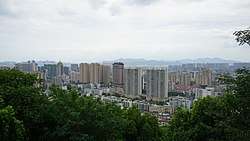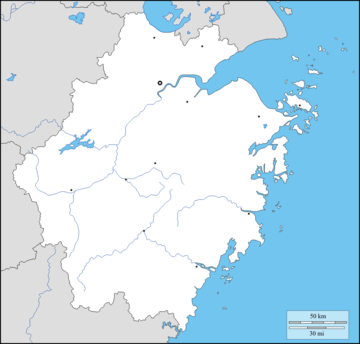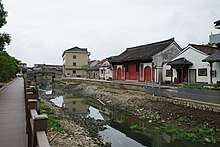Xiaoshan District
Xiaoshan is one of ten urban districts of the prefecture-level city of Hangzhou, the capital of Zhejiang Province, East China. Xiaoshan was formerly a city in its own right, separated by the Qiantang River from Hangzhou proper, but the municipality was annexed by its more populous neighbor in 2001.
Xiaoshan 萧山区 Siaoshan | |
|---|---|
 Downtown Xiaoshan, as seen from Beigan Hill | |
 Xiaoshan Location in Zhejiang | |
| Coordinates: 30°10′N 120°15′E | |
| Country | People's Republic of China |
| Province | Zhejiang |
| Sub-provincial city | Hangzhou |
| Time zone | UTC+8 (China Standard) |
| Xiaoshan District | |||||||
|---|---|---|---|---|---|---|---|
| Simplified Chinese | 萧山区 | ||||||
| Traditional Chinese | 蕭山區 | ||||||
| |||||||
Xiaoshan has a permanent population with residential rights of around 1,511,000 and an additional non-permanent population of about 876,500. Most of the local residents are Han people who speak a local variety of Wu Chinese in addition to Mandarin Chinese. The area's history of human settlement dates back to more than 8000 years ago, as excavations at Xiaoshan's Kuahuqiao archeological site have shown.[1] Xiaoshan's manufacturing-dominated economy has made it one of the most affluent metropolitan districts in China. In 2012 it had a GDP of 161.2 billion CNY, or around $17,000 per capita. Hangzhou's international airport, Hangzhou Xiaoshan International Airport, is located in western Xiaoshan, close to the mouth of Hangzhou Bay. The district is also at the center of one of China's local real estate booms, as the demand for newer, more upscale housing from China's growing middle class has led to an explosion in construction of new high-rise condominiums. In addition, Hangzhou Xiaoshan Sports Centre is also found in Xiaoshan.

The local culture is deeply rooted in the area's communist character, and the Communist Party of China has a strong local presence and an estimated local membership of 250,000.[2]
Administrative divisions
Subdistricts:[3]
- Chengxiang Subdistrict (城厢街道), Beigan Subdistrict (北干街道), Shushan Subdistrict (蜀山街道), Xintang Subdistrict (新塘街道)
Towns:
- Louta (楼塔镇), Heshang (河上镇), Daicun (戴村镇), Puyang (浦阳镇), Jinhua (进化镇), Linpu (临浦镇), Yiqiao (义桥镇), Suoqian (所前镇), Yaqian (衙前镇), Wenyan (闻堰镇), Ningwei (宁围镇), Xinjie (新街镇), Kanshan (坎山镇), Guali (瓜沥镇), Dangshan (党山镇), Yinong (益农镇), Jingjiang (靖江镇), Nanyang (南阳镇), Yipeng (义蓬镇), Hezhuang (河庄镇), Dangwan (党湾镇), Xinwan (新湾镇)
Industry
Xiaoshan Economic & Technological Development Zone
Xiaoshan Economic & Technological Development Zone was established in 1990. The zone is only 10 km (6.2 mi) away from Hangzhou Xiaoshan International Airport, with Shanghai-Ningbo Expressway and Hangzhou-Qujiang Expressway passing through. Currently, it has formed leading industries including electronic communications, automobiles and auto parts, precision machinery, medical food, textiles, garments, chemical building materials.[4]
Economy
Loong Airlines has its headquarters in the Loong Air Office Building (Chinese: 长龙航空办公大楼; pinyin: Chánglóng Hángkōng Bàngōngdàlóu) on the property of Hangzhou Xiaoshan International Airport.[5]
References
- http://www.antiquity.ac.uk/ProjGall/liu/
- 中共杭州市萧山区第十五次代表大会隆重开幕——萧山网——中国县(市、区)第一网. www.xsnet.cn. Retrieved 2017-04-16.
- "杭州市-行政区划网 www.xzqh.org" (in Chinese). XZQH. Retrieved 2012-05-24.
- RightSite.asia
- "联系我们 Archived May 11, 2014, at the Wayback Machine." Loong Air. Retrieved on April 24, 2014. " 地址ADDESS [sic] 浙江省杭州市萧山国际机场5号路长龙航空办公大楼"